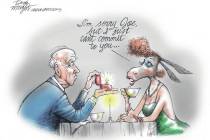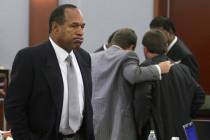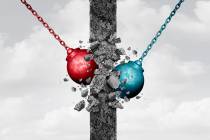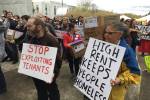Proposed minimum wage hike will hamper Nevada
Last month, a Carson City judge approved a proposed ballot measure for a $13 minimum wage, allowing supporters to begin gathering the necessary signatures to put the measure before voters in November. If approved, Nevada's minimum wage could rise by 58 percent, gradually moving from $8.25 up to $13 in 2024.
Proponents claim that the wage hike will pull families out of poverty and boost the economy, but the people of Nevada should take a lesson from the Great Recession.
In 2006, Nevada voters gave final approval to a ballot initiative to raise the state's minimum wage and link it to rise automatically with inflation. Within two years, it became clear that this was a big mistake: Nevada's wage floor rose on autopilot in 2008, 2009 and 2010, when the recession was at its most severe. In 2010, fully one-third of Nevada's job-seeking teens couldn't find work, and many more dropped out of the workforce altogether.
To be clear, the dire state of the entry-level job market in Nevada wasn't solely because of this three-step minimum wage increase. But empirical research confirms that it played a role. A 2015 study by Jeffrey Clemens and Michael Wither of the University of California found that minimum wage increases made the Great Recession even worse for less-skilled jobseekers.
These jobs weren't cut because Nevada employers are hard-hearted. For low-margin businesses such as restaurants and grocery stores, mandated increases in labor costs that can't be offset through higher prices leave business owners with little option but to scale back elsewhere. That is especially the case during a recession, when customers are even more price-conscious than usual. Research from Dr. Joseph Sabia of San Diego State University found that a minimum wage increase enacted during a recession has more than double the negative impact for some less-educated employees.
Looking beyond the state's own experience with minimum wage hikes, Nevadans should consider the very recent evidence emerging from cities that have raised their minimum wages close to the $13 level. Oakland's decision to increase its minimum wage to a comparable $12.25 in 2015 had disastrous consequences: The San Francisco Chronicle reported that at least 10 businesses in and around the city's Chinatown, including four restaurants and six grocery stores, closed in part due to the 36 percent wage hike.
The negative impact wasn't limited to restaurants: Asiya Jabbaar and Muriel Sterling, owners of child care facilities in San Francisco, both had to cut shifts and shave employee hours after the wage hike. In total, a survey conducted by the Employment Policies Institute of more than 220 affected businesses in the city found that roughly one-third had taken this same step.
The exact jobs impact of a $13-an-hour minimum wage in Nevada is difficult to pinpoint, although recent studies help provide an estimate. In 2014, the Congressional Budget Office predicted a $10.10 federal minimum wage would cause a reduction of 500,000 jobs nationally. Following this methodology, economists from the University of Miami and Trinity University estimated that 6,700 jobs would be lost from a $12 minimum wage in Nevada. At $13, this figure would rise even higher.
As they did in 2004 and 2006, proponents will try to make the minimum wage debate about stories, rather than statistics. Nevadans shouldn't ignore stories of poverty and hardship, but they owe it to those affected to acknowledge the economic and historical evidence of the negative consequences of an increased minimum wage.
— Michael Saltsman is research director at the Employment Policies Institute, which receives support from restaurants, foundations and individuals.























